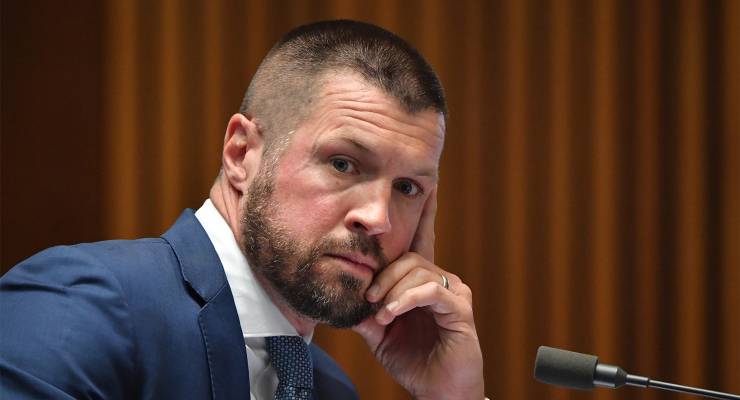
The managing director of Guardian Australia, Dan Stinton, has resigned just one week after the publication celebrated its 10-year anniversary.
The move was announced in an email from Guardian Media Group chief executive Anna Bateson to staff on Wednesday morning, saying Stinton had been offered a new role as CEO of an unnamed tech company.
Guardian Australia wouldn’t be drawn on the circumstances of Stinton’s departure, and declined to comment on who will take over his duties until the company can find a long-term replacement for the role.
“Under Dan’s stewardship, Guardian Australia has grown from a successful start-up to becoming a major independent player in the Australian media landscape as we mark our 10th birthday,” a spokesperson for Guardian Australia told Crikey in a statement.
“His strongly held sense of purpose, commercial acumen and savvy leadership skills have been essential to the rapid growth of Guardian Australia and will be much missed.”
As staffers at Guardian Australia remain focused on ongoing anniversary celebrations, top brass have already begun work on finding Stinton’s successor, according to one person familiar with the matter.
Stinton is likely to stay on in the medium term to assist with the transition, the person said, which will involve oversight from both The Guardian’s global editor-in-chief Katharine Viner and Guardian Australia‘s editor Lenore Taylor.
Stinton leaves the company on a high. Just last week, The Guardian reported that it broke even some five years after entering the Australian market, and has “almost tripled” revenue since then.
The publication entered the Australian market in May 2013, under Viner, promising Australian readers a progressive news alternative to the News Corp and Fairfax Media offering of the time.
On Guardian Australia’s 10th anniversary, Stinton said: “We’re proud of the business we’ve built over the past decade, and we’re grateful for all the supporters and partners who have helped make this success possible. We’re looking forward to building on this success and continuing to grow in the years ahead.”
Stinton took over the role in 2018 from Ian McClelland, after heading up product and technology at Seven West Media in Western Australia, where he oversaw operations at The West Australian, PerthNow, and 7 Perth, following stints at Yahoo7 and RTRFM.
Stinton declined to comment.
He is understood to have played a key role in driving a revenue surge at Guardian Australia over the past five years, buoyed by fruitful licensing deals with Google and Facebook, understood to be worth about $10 million and $15 million a year respectively.
The newsroom has seen waves of expansion as a result. Early last year, Guardian Australia expanded its reporting team to roll out state-level coverage and “geo-targeted content” for readers in Victoria, Queensland and New South Wales.
The growth most notably saw the publication mount competition to News Corp and Nine newspapers on state politics in each of the eastern states.
In the 12 months prior, the company “brought close to 50 people into the organisation”, 80% of whom joined as journalists, Stinton told the Australian Financial Review in March last year. The licensing funds that flowed in from Facebook and Google, he said, only expedited plans to invest in hiring sprees further down the track.
Note: The word “abruptly” was removed from the lede of this story for clarity.








Any examination of the coverage of Guardian Australia (hereinafter known as GA) with The Australian (hereinafter known as The Oz) will expose a strikingly different focus. GA focusses very much on social issues, whereas The Oz is very openly a promoter of a brutal repressive social and international order. Expansion of GA will help to focus on mass issues, whereas The Oz seeks to suppress them. GA’s growth is therefore very much in our interest.
Nevertheless Britain’s Guardian (hereinafter known as GMG – Guardian Media Group) was/is never any sort of relative of Red Flag or Militant. While it is the most Left of the eight most prominent British media publications, it does in the end stand with Order and protection of ruling class interests.
As the impact on us of the class war of the rich on the rest of us becomes increasingly up, close and personal, we will increasingly discover that our supposedly liberal mainstream media is not liberal at all because we have mistakenly used the lower case – our mainstream media is in fact generally Liberal.
While it’s (pro-Ukraine) war propaganda should be a negative, the irony is that most readers will see the opposite. Agreed, not an uncommon occurrence in media. In early coverage of Syria civil war, for instance, the ABC was very much promoting regime change, our ruling class favourite for dissident governments.
How is it propaganda to support a people who are suffering random bombing by a brutal dictatorship?
Russia has already lost – this was clear by about day 14 – and can end the war at any time by withdrawing.
If you’re prepared to compromise away Ukraine’s land and people, don’t be surprised if the world forces Australia to also compromise away its land and people in the near future.